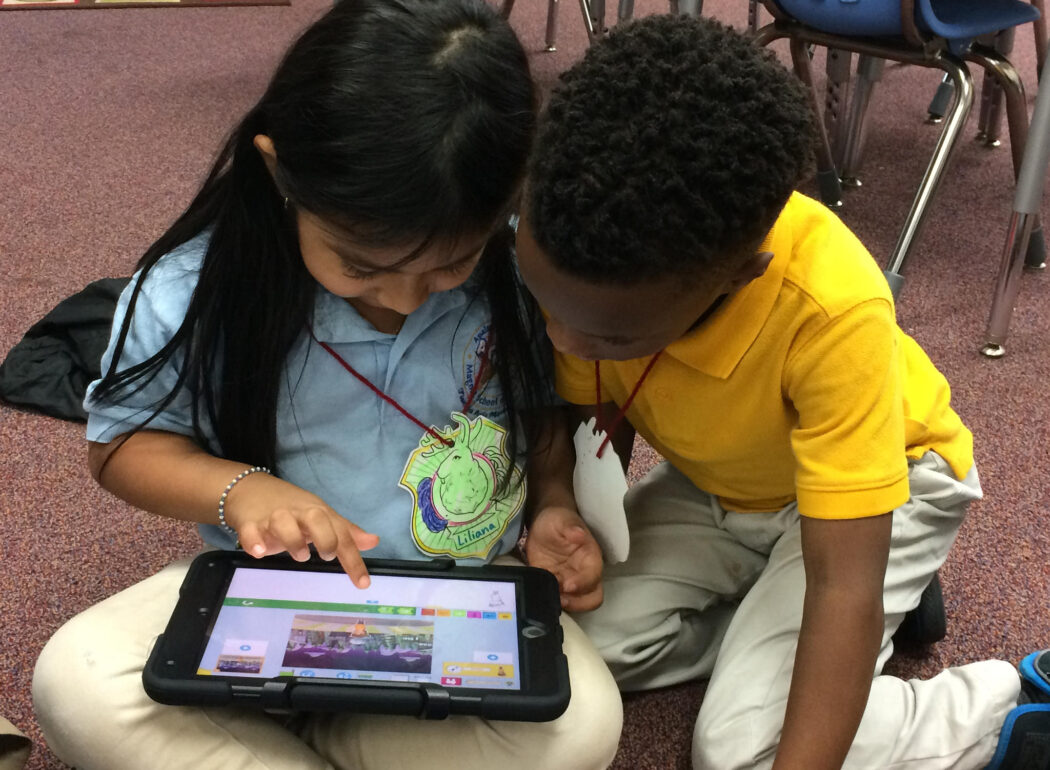
In our work with educators and parents, WFSU’s Education and Engagement team rarely encounters push-back regarding preschoolers’ exposure to PBS KIDS content. I believe a big reason is the trust our local friends place in PBS KIDS. (Incidentally, that trust is echoed nationwide in national surveys year after year). Also, like our partner outreach teams around the country, we use highly engaging off-screen learning activities before, during and after we feature media content. At our outreach and engagement gigs, kids, educators and parents have fun–and we do too. Lastly, our team regularly acknowledges the recommendation by the American Academy of Pediatrics, who advises no more than one hour daily of screen-time for preschoolers over the age of two. This stance mirrors conventional wisdom about parents as timekeepers of device use. So, the adults with whom we work seem to agree that our team promotes sound content, engaging learning experiences and reasonable recommendations for screen-time. I like to think of it this way: Our team and PBS KIDS provides the Quality and the adults in kids’ lives oversee theQuantityof time they spend with devices.
Typically, individuals who are skeptical or opposed to screen-time for preschoolers aren’t familiar with the values that undergird PBS KIDS content–the research-based, pro-social, curriculum-derived programs and resources that I’ve come to love as an educator and grandmother. They likely aren’t aware that educational programming positively impacts school readiness (e.g., Linebarger & Piotrowski, 2009; Wright, et al, 2001).
Sure, common concerns about screen-time are incredibly valid: They range from worries about obesity and lack of outdoor activity to interference with sleep and school readiness. But, aside from my Quality/Quantity adage above, what are some specific points educators and parents can use to make the case for thoughtful digital learning with preschoolers?
Enter Sara DeWitt. With the aim of dissuading concerns about children as users of media, DeWitt, VP of PBS KIDS Digital, spoke at a 2017 TED Talk conference. The title of her talk? Three Fears about Screen Time for Kids–and Why They’re Not True. DeWitt begins with the premise that most adults check their phones up to 50 times a day. By proxy then, hand-held devices are an ever-present part of their children’s world. DeWitt argues smart phones and other digital devices have now have permeated our lives and culture, so we should think of them as tools with important potential.
For me, one of DeWitt’s most compelling points comes early in the talk as she compares skepticism about children and digital devices to the fear voiced 50 years ago about children and television. In describing the way Mister Rogers’ Neighborhood revolutionized children’s television, she reminds us of how Fred Rogers “challenged society to look at television as a tool that could promote emotional growth” rather than as a disruptor of healthy, whole-child development. DeWitt passionately describes how Mister Rogers “looked out from the screen and…held a conversation, as if he were speaking to each child individually about feelings.” And with this analogy, she challenges her audience to shift their attitudes about digital devices; to think about “harness the power of technology” as a means for ready, relevant and transferrable learning in children’s off-screen lives.
DeWitt then presents her arguments to dispel three common anxieties about children’s use of digital devices. Using PBS KIDS digital resources as the basis, she challenges each fear with anecdotes, research and inspirational what-if’s.
Screen-time as an impediment to physical activity? Not when kids play “Going Batty,”a fantastically fun Wild Kratts game where players must literally flap their arms like a bat to succeed. (Researchers even found that after playing this game, young players transfer their on-screen experiences to off-screen play time by continuing to flap their wings and navigate to find mosquitoes)!
Screen-time as a disruptor of academic development? Not when Curious George math games are shown to help kids learn new skills and back-end data can accurately predict their scores on a standardized test. Or when the capacity of digital learning games is envisioned as a way to tailor instruction, or reduce assessment time and even testing anxiety.
Screen-time as a competitor of quality parent-child relationships? Not when parents can receive updates and discussion tips via text message about their child’s progress with PBS KIDS learning games. And not when parents understand and act on what we know about the importance of combining media and parent-child interaction.
DeWitt concludes her talk by reiterating the legitimacy of common concerns about digital devices in the hands of preschoolers. She challenges her audience to raise expectations for children’s media and to seek practical ways screen-time can be used to improve our kids’ development. Additionally, she reemphasizes the importance of taking an interactive role in our children’s media use. When adults view thoughtfully chosen screen-time as an opportunity rather than as a passive activity, children’s physical and academic development is supported and adult-child relationships can take new pathways.
Just like any tool, digital devices are best used in ways that build and strengthen. Their fantastic potential shouldn’t be dismissed because of common fears. Our task as the gatekeepers of digital tool use is really quite simple. Adults should be careful to monitor for both the Quality of the content and the Quantity of screen-time. And, as often as possible, we should extend that Quality by interacting with children about their media experiences. If we think of media selection and digital devices in these ways, our children will reap the richest of benefits.
Diane Kroeger, Curriculum Specialist
Linebarger, D. L., & Piotrowski, J. T. (2009). TV as Story-teller: How exposure to television narratives impacts at-risk preschoolers’ story knowledge and narrative skills. British Journal of Developmental Psychology, 96, 297-308.
Wright, J. C., Huston, A. C., Murphy, K. C., St. Peters, M., Pinon, M., Scantlin, R., et al. (2001). The relations of early television viewing to school readiness and vocabulary of children from low income families: The early window project. Child Development, 72, 1347-1366.


